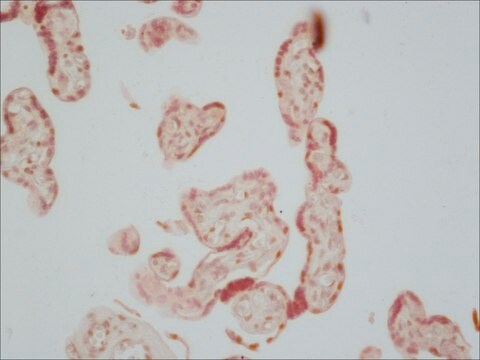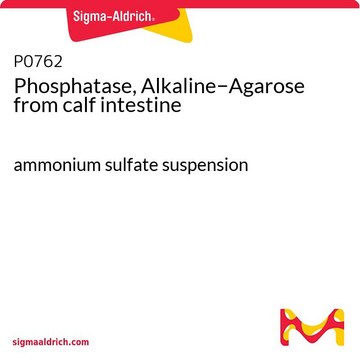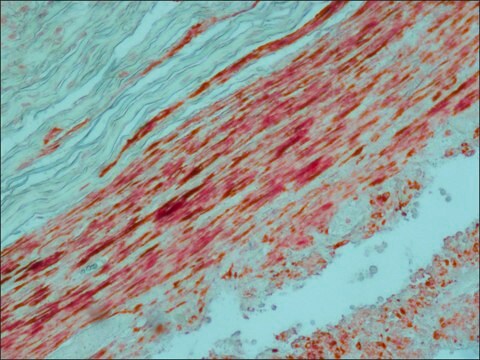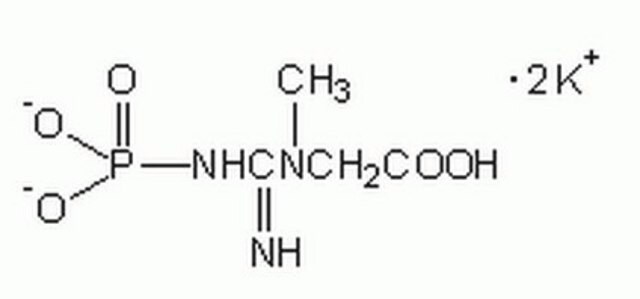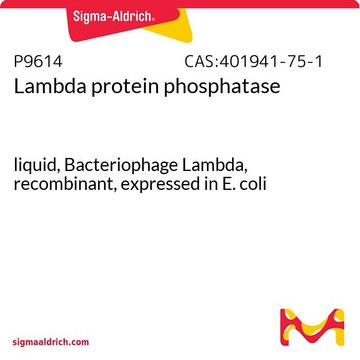추천 제품
생물학적 소스
mouse
결합
agarose conjugate
항체 형태
purified immunoglobulin
항체 생산 유형
primary antibodies
클론
8B6, monoclonal
형태
PBS suspension
종 반응성
human
라벨링 범위
2 mg antibody per mL bed volume
기술
immunoprecipitation (IP): suitable
동형
IgG2a
UniProt 수납 번호
배송 상태
wet ice
저장 온도
2-8°C
타겟 번역 후 변형
unmodified
유전자 정보
human ... ALPP(250)
유사한 제품을 찾으십니까? 방문 제품 비교 안내
일반 설명
In SDS gels, the product reacts with both Regan and Nagao isozymes of human placental alkaline phosphatase (hPLAP, 130 kDa, 67/130 kDa). By RIA, the antibody binds to hPLAP with an affinity constant of 5 × 109 LM-1. It does not react with PLAP-like enzymes.
Monoclonal Anti-Human Placental Alkaline Phosphatase (mouse IgG2a isotype) is derived from the 8B6 hybridoma produced by the fusion of mouse myeloma cells and splenocytes from immunized BALB/c mice. Alkaline Phosphatase (AP) is a broad and general term associated with non-specific phosphomonoesterases, with optimal activity at alkaline pH. Human placental alkaline phosphatase (EC 3.1.3.1; hPLAP), an isoenzyme of the AP group of enzymes, is ordinarily synthesized in the placental syncytiotrophoblast, becoming detectable in maternal circulation after the twelfth week of pregnancy. Small amounts of hPLAP are also found in the endocervix, fallopian tubes and lung. Very small amounts of heat-stable AP resembling hPLAP (hPLAP-like AP) are expressed in the testis, thymus and in rare colon epithelial cells.
면역원
Human epidermoid carcinoma cell line expressing placental alkaline phosphatase.
애플리케이션
Anti-Alkaline phosphatase human placental antibody coupled to agarose was packed in a column and used to purify alkaline-phosphatase conjugated FGF receptor out of conditioned media from COS-7 cells. Column was washed with 1M NaCl.
Cultured pancreatic islet cells were fixed with cold 4% paraformaldhyde at room temperature for 10 minutes and incubated with mouse monoclonal anti-Alkaline Phosphatase, Human Placental antibody at 1:500. Mouse monoclonal anti-Alkaline Phosphatase, Human Placental antibody was used to detect a unique molecular probe that consisted of the FGFR extracellular domain expressed as a chimera with human PLAP.
This immunoadsorbant may be used to purify fusion proteins produced using vectors expressing the hPLAP gene. Suitable for affinity purification and immunoprecipitation procedures of human placental alkaline phosphatase either natural or recombinant.It is alsu used in western blotting.
생화학적/생리학적 작용
Alkaline phosphatases are non-specific phosphomonoesterases that function optimally at alkaline pH. Placental alkaline phosphatase differs from the alkaline phosphatases of bone, liver and kidney, in the hydrolysis rate of various phosphate-based substrates, and also in its degree of inhibition by L-phenylalanine and L-homoarginine or levamisole. Human Placental Alkaline Phosphatase (hPLAP) has been studied as a potential tumor marker.
The human placental alkaline phosphatase (hPLAP and hPLAP-like AP) is present in the sera and tumor tissue of patients suffering from various types of cancer. Despite the continued interest in hPLAP as a potential tumor marker, it has not been widely used in the routine clinical laboratory, mainly because of the low overall specificity attained by methodologies such as heat-inactivation and sensitivity to L-phenylalanine.
물리적 형태
Suspension in 0.1 M phosphate buffered saline, pH 7.4, containing 15 mM sodium azide.
제조 메모
Prepared using purified antibody coupled to cyanogen bromide-activated agarose.
면책조항
Unless otherwise stated in our catalog or other company documentation accompanying the product(s), our products are intended for research use only and are not to be used for any other purpose, which includes but is not limited to, unauthorized commercial uses, in vitro diagnostic uses, ex vivo or in vivo therapeutic uses or any type of consumption or application to humans or animals.
적합한 제품을 찾을 수 없으신가요?
당사의 제품 선택기 도구.을(를) 시도해 보세요.
Storage Class Code
10 - Combustible liquids
WGK
WGK 3
Flash Point (°F)
Not applicable
Flash Point (°C)
Not applicable
시험 성적서(COA)
제품의 로트/배치 번호를 입력하여 시험 성적서(COA)을 검색하십시오. 로트 및 배치 번호는 제품 라벨에 있는 ‘로트’ 또는 ‘배치’라는 용어 뒤에서 찾을 수 있습니다.
Extremely high maternal alkaline phosphatase serum concentration with syncytiotrophoblastic origin
Boronkai A, et al.
Journal of Clinical Pathology, 58(1), 72-76 (2005)
Adam W Barb et al.
Protein science : a publication of the Protein Society, 21(10), 1456-1466 (2012-08-02)
Paramagnetic lanthanide ions when bound to proteins offer great potential for structural investigations that utilize solution nuclear magnetic resonance spectroscopy, magnetic resonance imaging, or optical microscopy. However, many proteins do not have native metal ion binding sites and engineering a
Christoph Mundhenke et al.
The American journal of pathology, 160(1), 185-194 (2002-01-12)
Binding of fibroblast growth factors (FGFs) to their tyrosine kinase-signaling receptors (FGFRs) requires heparan sulfate (HS). HS proteoglycans (HSPGs) determine mitogenic responses of breast carcinoma cells to FGF-2 in vitro. For this study, we examined the role of HSPGs as
Songshan Ye et al.
Molecular medicine reports, 13(6), 4593-4598 (2016-04-16)
Paeoniflorin, the major component of Paeonia lactiflora pall, has previously been reported to prevent thrombosis. Plasminogen activator urokinase (uPA) is a serine protease that markedly facilitates normal thrombosis resolution. Paeoniflorin and uPA have been linked to the mitogen‑activated protein kinase (MAPK)
Frank C Cackowski et al.
Genomics, 84(1), 82-94 (2004-06-19)
Neuropilin-1 (NRP1) is a coreceptor to a tyrosine kinase receptor for both the vascular endothelial growth factor (VEGF) family and semaphorin (Sema) family members. NRP1 plays versatile roles in angiogenesis, axon guidance, cell survival, migration, and invasion. NRP1 contains three
자사의 과학자팀은 생명 과학, 재료 과학, 화학 합성, 크로마토그래피, 분석 및 기타 많은 영역을 포함한 모든 과학 분야에 경험이 있습니다..
고객지원팀으로 연락바랍니다.